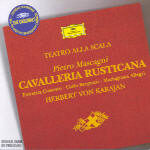

Hearing Karajan’s work before the early-to-mid-’80s, when his navel-gazing self-indulgence, odd casting, and control-freakery decimated and distorted every opera he directed/conducted/engineered, is invariably a treat,

This is a wonderful surprise. As one who found Karajan’s 1986 recording (DG) of this opera bloated and over-examined (though well sung and played), the

By general acclamation this 1963 production ranks as the finest of Karajan’s four complete cycles, and while some listeners might prefer individual performances from later

This set collects Herbert von Karajan’s renowned DG Sibelius symphony recordings of Nos. 4-7 together with Okko Kamu’s less celebrated but no less worthy renditions

Herbert von Karajan conducted Mascagni as if he were as great as Mozart or Verdi, and he almost convinces us. His approach is typical of

Herbert von Karajan’s reputation (held in some quarters) for illuminating interpretations of French music is only partially supported by this new collection. For the most

Karajan’s Brahms emphasizes structural logic wedded to the Berlin Philharmonic’s luxuriant and highly refined tonal palette–meaning these renditions sound mighty pretty, even if they’re not

Herbert von Karajan’s previous Vienna Philharmonic Dvorák Eighth (recorded for Decca in 1961) was notable for the conductor’s uniquely emphatic gesturing (particularly in the slow

Herbert von Karajan’s 1977 Beethoven cycle appeared during the height of his fame and was embraced wholeheartedly by both press and public. Indeed, in some

Even as far back as the mid-1960s (when these recordings where made) Herbert von Karajan had the Berlin Philharmonic sounding (for better or worse) like
![]()
